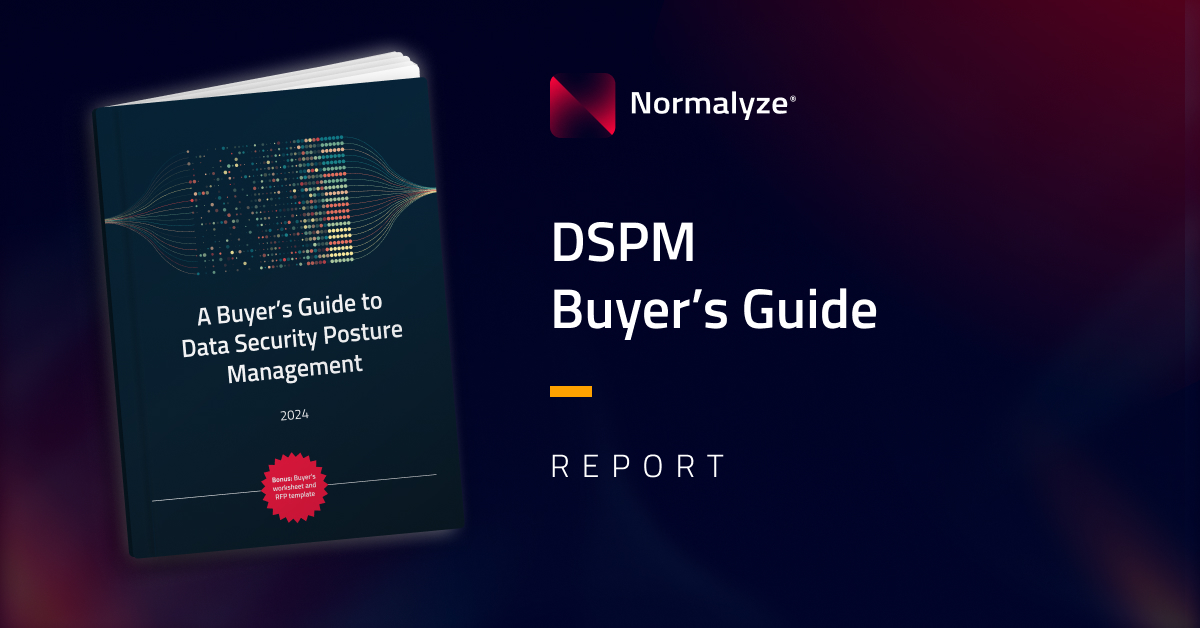Securing sensitive data is a major challenge for security teams because of data proliferation. Data proliferation is driven by adoption of a variety of cloud workloads, explosion in access privileges, and other reasons. To help with this challenge, the Normalyze cloud platform prioritizes the breadth of its data store coverage. The ability to discover any type of data (including shadow data) and classify its sensitivity extends to all types of data stores. Normalyze’s breadth of coverage is the most comprehensive across the DSPM category, and we have added even more data stores to this list.
Broad coverage for data store types
Business needs lead to adoption of a variety of cloud data workloads in every company. To help security teams adequately protect sensitive data in the cloud, data security solutions must scale to all types of data workloads in use. The Normalyze Cloud Platform supports:
- Block stores
- Object stores
- Managed cloud databases
- Managed cloud data warehouses
- Self-hosted, embedded databases
- Data stores in isolated private cloud environments
- Data stores on-premises (private data centers)
Data security solutions must classify as well as discover data across the full range of data stores. Classification tells you what kind of data is in a data store, and if the data are sensitive, so you can take proper steps to ensure it’s secure and in compliance with regulatory requirements.
Normalyze offers best-in-class data classification by analyzing the actual content rather than just the object/table/column names. Our ready-made classifiers accelerate your implementation, and help identify regulated data including PII, PCI, PHI etc. across unstructured data stores as well as databases, tables, and columns in structured data stores. We also support creation of custom classifiers to identify proprietary, confidential data that is unique to your environment.
Sensitive data classification across 30+ data stores
Normalyze now supports sensitive data classification in AWS DynamoDB, Azure CosmosDB for Mongo, Azure CosmosDB for PostgreSQL, Azure CosmosDB for Cassandra. With these additions, Normalyze can now classify sensitive data in more than 30 data stores across various popular cloud platforms and on-premises environments.
| AWS | Azure | GCP | Non-cloud native |
| S3 Bucket | Blob | Bucket | MongoDB |
| RDS MySQL | File Shares | Cloud SQL | Cassandra |
| Aurora MySQL | Azure SQL | Memorystore for Redis | |
| RDS MariaDB | PostgreSQL | Memorystore for Memcache | |
| Postgres | MariaDB | ||
| Aurora Postgres | MySQL | ||
| MS SQL | Azure Cache | ||
| Oracle | CosmosDB for Mongo | ||
| DocumentDB | CosmosDB for PostgreSQL | ||
| MemoryDB/Redis | CosmosDB for Cassandra | ||
| Redshift | |||
| EBS Volume | |||
| DynamoDB | |||
| ElastiCache for Redis | |||
| ElastiCache for Memcached | |||
| Keyspaces |
| New |
Try Normalyze in Your Environment!
If this news of powerful data classification sounds helpful, we invite you to try Normalyze for free in your own environment. Sign up for a free trial. Setup takes just 10 minutes, after which you can see for yourself how the power of Normalyze will provide your security teams with 100 percent visibility and control of cloud-resident sensitive data.
